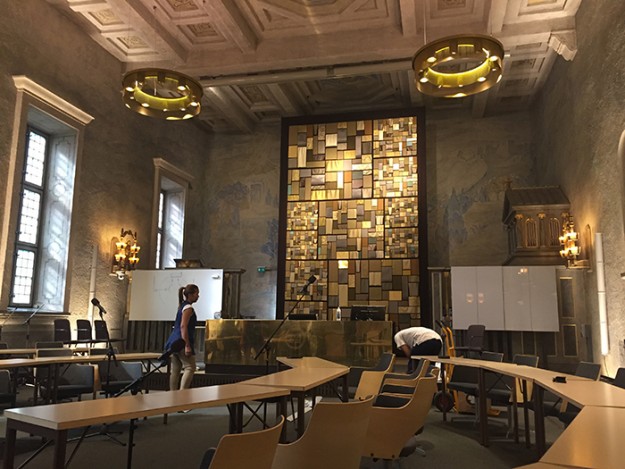
What would happen to you if you were sucked into a black hole? Would you disappear without a trace?
Physicists have argued for years that these bottomless pits of space-time gobble up anything that gets too close to their gravitational field, seal it away for good, and then eventually evaporate, leaving no trace of what was once inside. The problem is, that scenario violates one very important principle of quantum physics: that the information about the physical state of anything in the universe must be retrievable, no matter what happened to it. It’s called the “information loss paradox”, and it’s the hot question on the table when Stephen Hawking comes to KTH Royal Institute of Technology on Monday to kick off a week of debate and discussions with leading physicists.
Hosted by the research institute, Nordita (which is driven by KTH and Stockholm University), the Hawking Radiation Conference sounds a little like a “lock them in a room and don’t let them out until they come up with something” scenario.
“The purpose is to bring together the people who have studied Hawking since the 1970s, and put them in one room and try to solve this question,” says conference organizer Laua Mersini-Houghton, a theoretical physicist from University of North Carolina. “When I had the idea for this conference, I called Professor Hawking. He immediately said yes and he set the date.”
The list of conference participants reads like a who’s who of modern physics history, featuring such prominent names as Leonard Parker, Gerard ‘t Hooft and Jim Bardeen. But if you had your hopes set on dropping in for a listen, alas, I’m afraid this cosmic gathering is closed to the public.
But I’ll be reporting regularly from the conference, so stay tuned to this blog for the latest.
David Callahan
Conference homepage at Nordita.org
Download the conference poster
Here’s the full list of participants:
- Stephen Hawking, University of Cambridge
- Jim Bardeen, University of Washington, Seattle
- Philip Candelas, University of Oxford
- Steve Christensen, UNIX Packages LLC
- Ulf Danielsson, Uppsala University
- Paul Davies, Arizona State University
- Fay Dowker, Imperial College London
- Michael Duff, Imperial College London
- Larry Ford, Tufts University
- Katie Freese, Nordita
- Steve Fulling, Texas A&M University
- Jim Hartle, University of California, Santa Barbara
- Gerard t’Hooft, Utrecht University
- Gary Horowitz, University of California, Santa Barbara
- Werner Israel, University of Victoria
- Claus Kiefer, University of Cologne
- Jorma Louko, University of Nottingham
- Charles Misner, University of Maryland
- Emil Mottola, Florida Atlantic University
- Jack Ng, University of North Carolina at Chapel Hill
- Jerome Novak, French National Centre for Science
- Don Page, University of Alberta
- Leonard Parker, University of Wisconsin, Milwaukee
- Joe Polchinski, University of California, Santa Barbara
- Carlo Rovelli, Aix-Marseille University
- Philippe Spindel, University of Mons
- Kelly Stelle, Imperial College London
- Andy Strominger, Harvard University
- Bo Sundborg, Stockholm University
- Paulo Vargas Moniz, Universidade da Beira Interior
- Francesca Vidotto, Radboud University Nijmegen
- Bob Wald, University of Chicago
See that little blue button that says “Subscribe”? over in the right margin. That’s your key for keeping up with the latest on the Stockholm Technology Blog. Get on the list now!

You could at least have it as a live video podcast for public! 🙂
Is it possible for the public to come along?